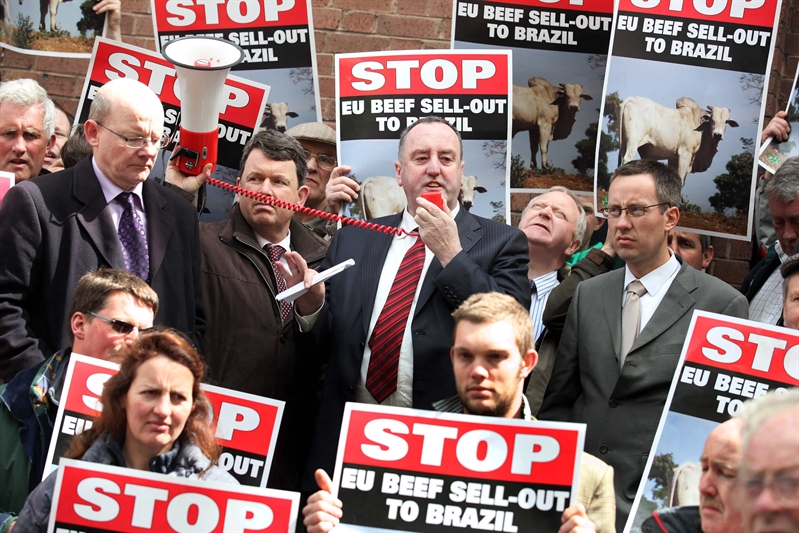Mercosur to consider trade deal with United Kingdom

EurActiv | 13 October 2016
Mercosur to consider trade deal with United Kingdom
By Cécile Barbière
The EU and South America’s Mercosur bloc could strike a free trade deal within two years, according to Argentina’s Commerce Secretary Miguel Braun. After Brexit, Mercosur would be open to a separate trade deal with the UK.
Trade negotiations between the EU and Mercosur nations are still on track, despite the UK’s decision to leave the bloc and uncertainty over the future of the EU’s other major trade agreements – TTIP and CETA.
After the EU and Mercosur exchanged offers last May on opening up markets, representatives of Mercosur and the EU are meeting again this week in Brussels to continue the discussion on the free trade agreement.
“Mercosur has moved to improve its offer on the table and we are optimistic that we can work towards a better deal,” explained Argentine Commerce Secretary Miguel Braun during a visit to Brussels (12 October).
Dormant negotiations since 2004
The four active members of Mercosur ( Argentina, Brazil, Paraguay, Uruguay) started the trade negotiations with the EU in 1999, but talks have been delayed multiple times and been completely dormant since 2004.
After 12 years, negotiations were restarted last May, when the EU and the Mercosur exchanged first market access offers. But the first offers were described as not sufficient and needed to be scaled-up.
Asked about the potential impact of Brexit on the negotiations, Miguel Braun responded that “the UK is still part of the EU, and we are still negotiating with all the EU”.
“But of course (Brexit), would reduce the size of the market, there are some challenges to be addressed,” the Secretary of State said. “At the same time we are open to discuss future potential trade deals with the UK,” he added.
After years of deadlock in the negotiations, the Argentine is hoping the trade deal could be agreed soon. “In terms of negotiations, we are optimistic, we can move forward on a good path, maybe one or two years.”
Braun’s optimism was more cautious regarding the ratification process. “The second step, the ratification, is more uncertain”, in terms of timing, he admitted. “Other deals that the EU is making are giving us interesting information about the timing, the political scenarios, but that doesn’t change the deal we think is best for the EU and Mercosur.”
Regarding the situation of other trade deals, like TTIP with the USA and CETA with Canada, Argentina’s representative remains optimistic. “Mercosur is negotiating the deal that we believe is the best for Mercosur and the EU independently of the other undertakings and we can’t really speculate on how quickly other trade deals of the EU will come through,” he added.
Mercosur new trade deal appetite
Revitalisation of the trade discussions between Mercosur and the EU has been a result of the four Latin countries’ new appetite for trade deals. With recent changes in the Brazilian government, “we are more synchronised regarding foreign relations of Mercosur, nowadays compared to the situation of last year for instance”, added Daniel Raimondi, Under Secretary for Economic Integration in the Americas and Mercosur within the Foreign Affairs Ministry of Argentina.
Election of the pro-business government of Mauricio Macri in Argentina last year also contributed to setting up the Mercosur /EU trade deal as a new political priority for the South American bloc.
“There is now a core agreement that Mercosur has to negotiate significant trade deals,” explained Braun, citing Canada and Korea as examples.
Background
The EU is currently negotiating a trade agreement with Mercosur as part of the overall negotiation for a bi-regional Association Agreement which also cover a political and a cooperation pillar.
Mercosur is composed of Argentina, Brazil, Paraguay, Uruguay and Venezuela, while Bolivia is in the process of accession.
The objective is to negotiate a comprehensive trade agreement, covering not only trade in industrial and agricultural goods but also services and establishment and government procurement, and the improvement of rules inter alia on government procurement, intellectual property, customs and trade facilitation, and technical barriers to trade.
The EU is Mercosur’s first trading partner, accounting for 20% of Mercosur’s total trade in 2013. EU-Mercosur trade in that year was €110 billion.
Mercosur is the 6th most important export market for the EU (2013 data).
Mercosur’s biggest exports to the EU are made of agricultural products (43% of total exports) and raw materials (28%), while the EU mostly exports manufactured products to Mercosur and notably machinery and transport equipment (46% of total exports) and chemicals (22% of total exports in 2013).





